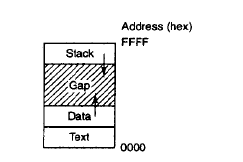Memory allocated to the parent and the child processes


Member • Aug 8, 2013
Member • Aug 8, 2013
Nayan GoenkaWhen your child process was defined, it was already allocated some memory while compiling the code for the first time. So that comes into role. However if a process invokes another one, and in a loop, that is multiple times, then it will check if the child process is independent or dependent. If the child process is actually another module, it will have its private working like other processes. But if it is completely dependent on your main process, then it will acquire memory within the boundary or stack of main process and register itself as primary allocated memory for main process. So it all depends on type of process for which it takes corresponding memory location.
Member • Aug 9, 2013
rukawaSay for example the child is completely dependant on the parent (I think this means that the child does exactly the same work as the parent), does it mean that all its memory space will be within the boundaries of the parent's memory space?
Member • Aug 9, 2013
does it mean that all its memory space will be within the boundaries of the parent's memory space?YES.
Member • Aug 9, 2013
Member • Aug 9, 2013